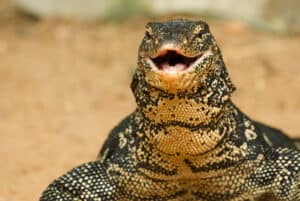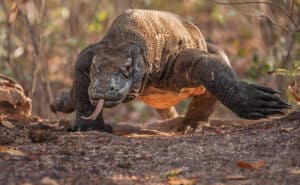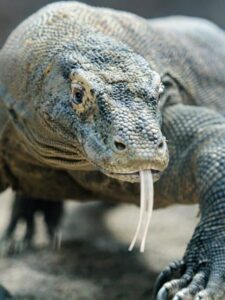Leopard geckos are adorable little lizards with a penchant for long stretches without food. While this behavior may be alarming to new pet owners, it’s actually a natural aspect of a leopard gecko’s reptilian makeup. But how long is too long? In this article, we’ll discuss how long your leopard gecko can go without eating when it’s dangerous, and the potential reasons it stopped eating in the first place.
How Long Your Leopard Gecko Can Go Without Eating
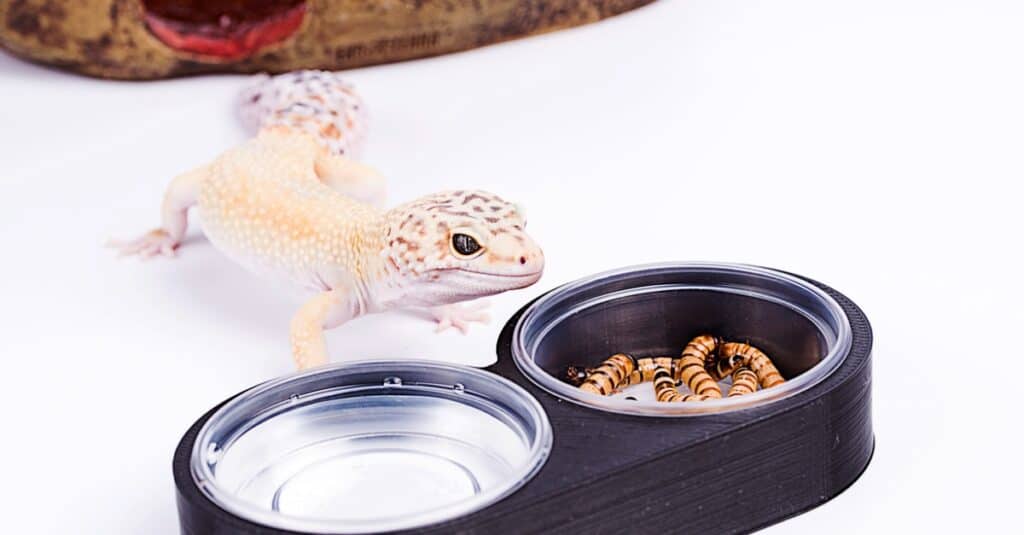
Leopard geckos can safely go 10-14 days without food.
©iStock.com/Kaan Sezer
Leopard geckos can safely go without eating for as long as 10-14 days at a time. Wild leopard geckos can go even longer for food, potentially up to two or three months, but this is not recommended in captivity. Additionally, it’s critical to remember that hatchlings and juveniles need food more often than adults because their fat reserves are less developed. They also need the extra energy to fuel their growth.
How Can Leopard Geckos Go So Long Without Eating?
Leopard geckos can go so long without eating because of the fat deposits in their tails. These deposits provide their bodies with the energy they need to survive. The fatter and plumper a leopard gecko’s tail is, the longer it can go without food. Keep in mind, however, that this is strictly a survival mechanism. It would be best if you always aimed to provide your pet leopard gecko with regular and adequate nutrition.
There’s another factor at play in the eating habits of leopard geckos. During winter, these reptiles enter brumation, basically the cold-blooded equivalent of hibernation. This slows their metabolic processes and allows them to survive on fewer calories. It also causes them to eat less. A leopard gecko in a state of brumation can go up to three months without food.
How Often Should a Leopard Gecko Eat?
Adult leopard geckos, as reptiles, do not usually require food daily. This is especially true in winter when their metabolisms slow in response to dropping temperatures. Because they don’t need food every day, their care routine has the reputation of being reasonably low-maintenance. Ideally, it would help if you fed your adult leopard gecko at least once every two or three days. If your leopard gecko doesn’t eat at least once a week, it risks losing weight and becoming weak or ill. Hatchlings or juvenile leopard geckos should be fed daily; this also goes for sick geckos. Whatever your leopard gecko’s age and energy requirements, always ensure it has access to plenty of fresh water.
When Does a Lack of Nutrition Become Dangerous for Leopard Geckos?
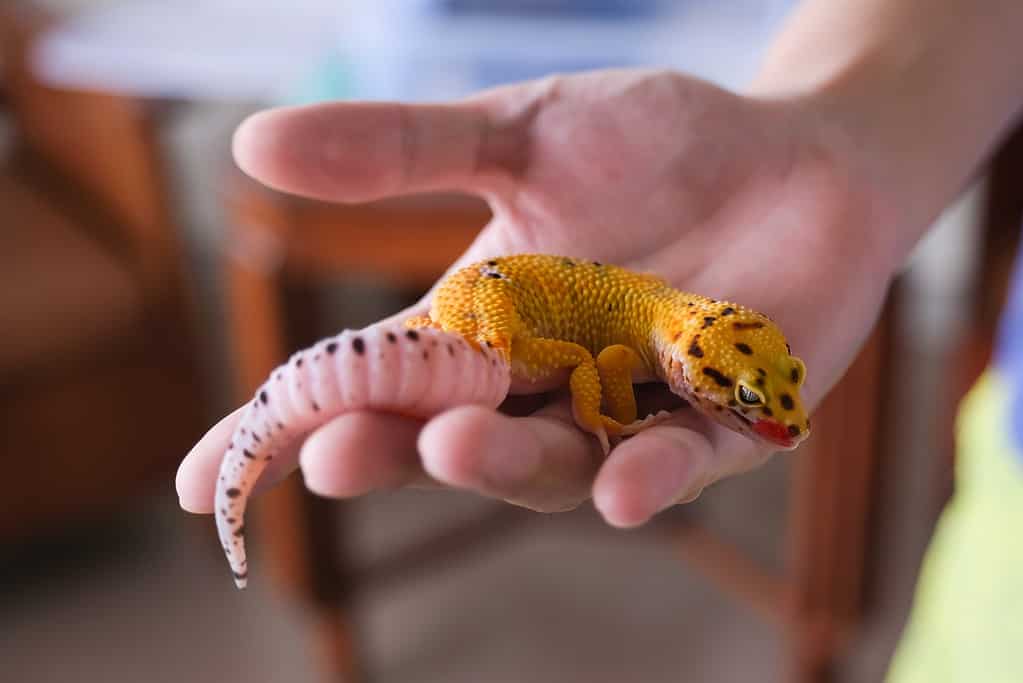
Leopard geckos who go longer than two weeks without eating risk developing health issues.
©Fresh Stocks/Shutterstock.com
Leopard geckos who go longer than 10-14 days without eating place themselves at risk for weight loss, weakness, illness, and (in extreme cases) death. They may be able to go for weeks or even months without food, but chances are they won’t be in optimal health. If your leopard gecko passes the two-week mark and still hasn’t eaten, it’s time to seek the advice of a veterinarian. A leopard gecko who hasn’t eaten in two to three months is at serious risk of significant health issues.
Why Isn’t My Leopard Gecko Eating?
There are several potential reasons your leopard gecko is refusing food. These include:
- Cold temperatures: As fully cold-blooded reptiles, leopard geckos rely on external heat sources to warm their bodies, which is critical for digestion. If your leopard gecko can’t get warm enough, it may be unable to digest food. In this case, it might enter brumation and slow food intake or stop eating altogether. Fortunately, this usually resolves in a few months or when the temperature rises.
- Stress: Stress often causes animals to change their eating habits, usually by reducing their food intake. Common causes of stress include (but are not limited to) an inadequate enclosure, a lack of hiding places in the habitat, excessive heat or cold, and changes in the living environment.
- Illness or injury: Naturally, if your leopard gecko is sick or hurt, this will affect its appetite. If you suspect your pet is unwell, consult a veterinarian immediately.
- Dehydration: Leopard geckos need access to clean water on a daily basis. If they get dehydrated, they may choose to stop eating. This is because the process of digestion consumes water.
What Do Leopard Geckos Eat?
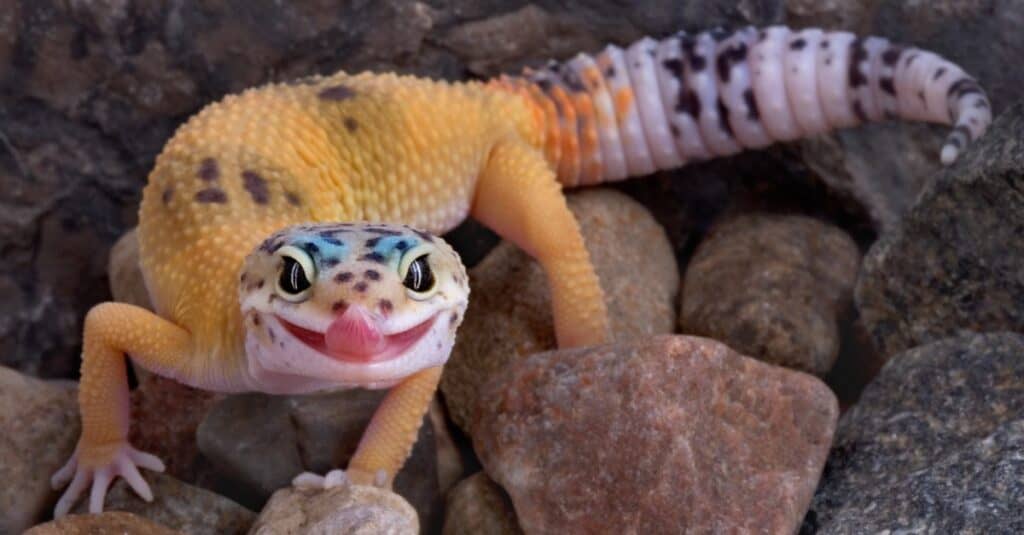
Leopard geckos are insectivores, which means they eat insects.
©iStock.com/CathyKeifer
As insectivores, leopard geckos subsist on live insects. These include crickets, small locusts, calci worms, waxworms, and mealworms. It’s important that the insects be alive at the time of feeding. Generally speaking, avoid giving your leopard gecko insects that are bigger than the space between its eyes. In addition to its regular diet, you may also want to give your pet nutritional supplements.
When Should I Feed My Leopard Gecko?
The best time to feed your leopard gecko is either early in the morning or late in the evening. These are the times that leopard geckos are most active in the wild.
Conclusion
In summary, captive leopard geckos should go no longer than 10-14 days without eating. However, most individuals are capable of surviving without food for weeks or even months if necessary. If your leopard gecko refuses food for a prolonged period of time, consider taking it to the vet to find out what’s going on. Possible causes include excessive cold, stress, illness, injury, or dehydration.
The photo featured at the top of this post is © feri ferdinan/iStock / Getty Images Plus via Getty Images
Thank you for reading! Have some feedback for us? Contact the AZ Animals editorial team.



